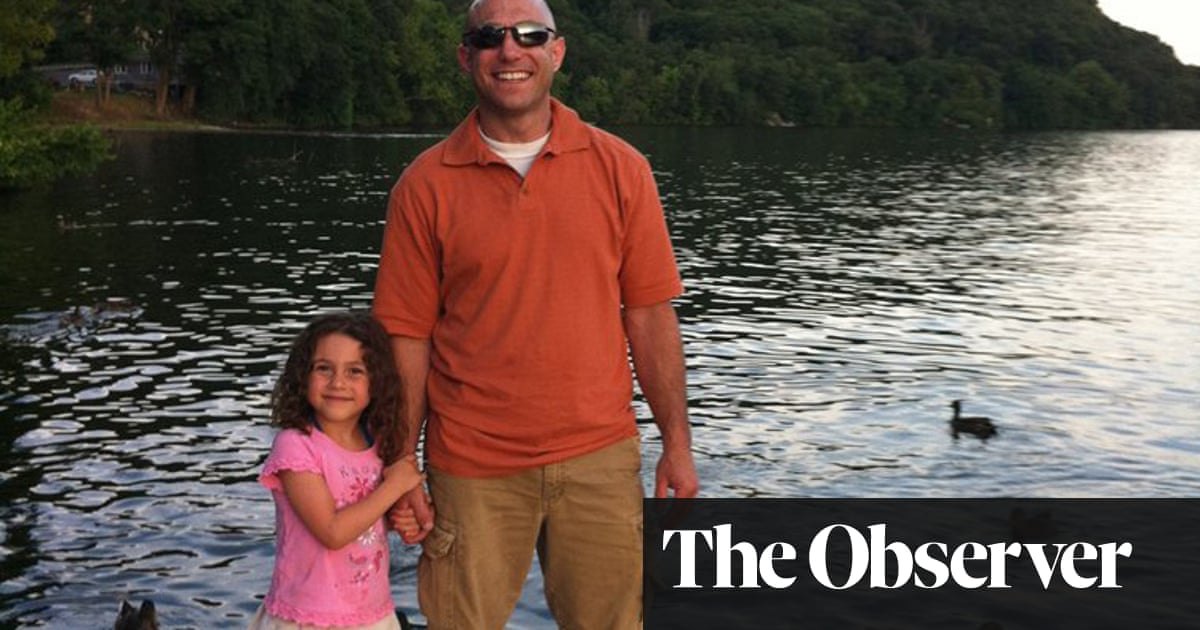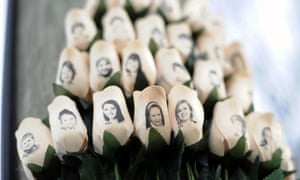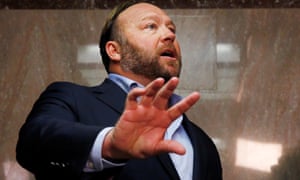Twenty children died in the 2012 US school shooting. Now Jeremy Richman, too, is dead, tormented by conspiracy theorists and unbearable grief

There are some driveways that you hesitate before walking up and some doors that you pause at before knocking. A couple of years ago I drove the two hours from New York City to Newtown in Connecticut to meet Dr Jeremy Richman, a neuroscientist and educator whose daughter, Avielle, had been among the 20 children murdered with six of their teachers in the massacre at Sandy Hook Elementary School in 2012.
I was, at the time, collecting stories for something I was writing about the endurance event Tough Mudder; Richman led a 50-strong team, Mud For Brains, which, since his daughters murder, had run the gruelling 10-mile obstacle course several times to raise funds for the Avielle Foundation, which had been set up in her name.
It took a time to find the address Richman had given me, but when I did so I sat for a little while across the street, taking in the neat painted house and the garden with spring sun falling on its rolling lawn and on the woodland beyond. I neednt have approached Richmans front door with any trepidation. He greeted me with a wide smile, holding eye contact, introducing me to his wife Jennifer and their daughter Imogen, then nearly two, before taking me up to the studio room at the top of the house to chat. People struggle to find a way of talking about what happened to our family, he said. But people who kid-glove us quickly learn that is not necessary.
In this spirit we started talking first about the therapeutic effects of the Tough Mudder event. Richman, a teacher of martial arts who radiated a compact energy, had been introduced to it by a neighbour, and had found it a perfect focus for community. Their team all of whom had been involved in the tragedy in different ways would meet in a studio gym at the top of his garden on a Wednesday evening throughout the year, to train and prepare. It was just one of the ways that Richman had looked to find purpose in friendship.
He and his wife had set up the foundation in Avielles name threedays after the killings. Jennifer Hensel was a microbiologist who worked on developing cancer drugs for children. Richman had a research background focusing on therapeutic mechanisms for Alzheimers disease. They decided to pool their efforts to create a foundation to study the neuroscience of violence, to fund research that looked at the risk factors that led to it and the compassionate factors that led away from it, so that other people might not suffer as we were suffering.
Richman recalled how a lot of people had said to him when he embarked on his research, what can you do about violence Jeremy? It is in our blood, in our DNA. He argued back that as a social species kindness was also part of our DNA. He insisted from the beginning that the foundation would be an active programme. When I point out the environmental factors that predict violence people cross them off and say Im fine, he said. But the fact is that if you are not actively engaged in protective factors for brain health building community, developing empathy, engaging in challenge then you are moving downstream, and that is a fact of life.
Earlier that year Richman and Hensel had received the Yale University Department of Psychiatrys Research Advocacy Award; President Obama invited them to forums on mental health and gun control. As well as talking and lecturing to groups across the US, Richman offered a series of monthly events in Newtown, with guest speakers, and called it the Brainstorm Experience.
While he discussed all this Richman emphasised how the foundation not only borrowed his daughters name, but also her spirit; Avielle, who was six when she was killed, was a lover of stories, and a steadfast friend for anyone she thought in need. I noted how every time Richman mentioned her name, he made a point of smiling.
He showed me the hill that she sledded down outside, and the woods she had loved to play in, and then he drove me around his regular haunts. We had a coffee in the bagel bakery that Richman had taken Avielle to every Saturday morning; we stopped by the office in the old Town Hall which was home to the foundation; we paused at the fire station where the parents had gathered when news of the tragedy first broke, with its 22 gold stars on its roof, 20 small ones for each child, six larger ones for their teachers. And then we drove up to the hilltop cemetery where Avielle was buried along with several of her classmates, all in a row. At weekends, and during holidays, Richman and the family would come up here with a picnic to spend time with her.
Quite often, since I met Richman, I have found myself dwelling on that afternoon. This was partly due to the fact that he had a gift for storytelling, for offering life lessons. The one I remembered best was a story he told about a visit that he and his wife had made to China when they had first met. They had got involved in a programme to help repatriate kung fu masters who had been exiled during the Cultural Revolution. We were travelling there with this 80-year-old guy, he told me, and he was in crazy good shape. He invited you to punch him as hard as you could and he wouldnt flinch. One day I asked him, you know, what is your secret? I thought he was going to say: you have to train 10 hours a day or whatever. What he actually said was, number one: you have to get together often with your friends. Number two, you have to laugh every day. Number three, you have to sleep well.
Richman and I corresponded a little after that meeting. He would send an email out of the blue trying (in vain) to persuade me to join his team on their latest endurance outing: Hey Amigo, hows life? Want to run the June Mt. Snow Tough Mudder with tribe Mud for Brains? I wrote back with excuses about my dodgy ankles and shared a few things I had written which I thought would interest him, about the new science of loneliness or the neurology of the murderers brain, to which he responded with curiosity and updates on his own research.

For all these reasons it felt, then, like an almost physical blow to hear the news on Monday last week that in the early hours of that morning Jeremy Richmans body had been discovered by electrical contractors at Newtown Town Hall, in the theatre where he gave his Brainstorming events. There were few details in the report other than to state that the police were treating the death as suicide, and that a note had been left. Richman was 49. He and Hensel had had two children after Avielle, Imogen, now four, and Owen, two.
I would not begin to speculate what was going through his mind before he made that last decision. As anyone who has even a glancing knowledge of suicide knows, all the act takes for someone dealing with severe trauma is a very bad day or a very bad hour. Richmans wife, Jennifer, asking for privacy, grief heaped upon grief, noted in a statement: My champion and the love of my life is the person who had every tool in the toolbox at his disposal [But] he succumbed to the grief that he could not escape. To parent our children without my champion shatters my heart and I will love my best friend forever.
There is no easy explanation, either, to find in Richmans death. There are two contexts, however, that have been hard to ignore. The first is that the previous week two of the teenage survivors of the Parkland school shooting in Florida had also taken their own lives. Richman, in his public statements over the years, had often noted how each time there was a new tragedy, a new mass shooting and there were so very many he and Jennifer would just sit and bawl.
Like many Americans, he believed that Sandy Hook would be a turning point for the nation and its gun laws. When will it be enough? he said in an interview in 2018. I feel like were letting it happen. That there are things that could be done, that arent being done. The other, related, context in which Richmans death asks to be viewed is the unspeakable way in which the burden of grief that the Newtown parents have borne was added to by those who sought to exploit the tragedy.
In the eyes of the internet Sandy Hook has become synonymous with the most macabre and vicious case study in conspiracy theory. From the day after the shooting the inhuman suggestions that the murders had been staged by the American deep state or the anti-gun lobby, that the grieving parents were crisis actors, and that their children had not been murdered at all, has been fuelled and spread across social media.
It is impossible to comprehend the effect that those accusations might have on families like Richmans. Another Newtown father, Lenny Pozner, whose six-year-old son Noah was killed alongside Avielle, has made it his mission to try to clear the internet of the conspiracies. As a result he had been hounded for years with death threats that have forced him to move house eight times for his own safety. Last Tuesday, in response to the news of Richmans death, Pozner tweeted a quote from Dr David Schonfeld, director of the National Center for School Crisis and Bereavement in Los Angeles. The loss of the assumptive world, on top of the actual trauma, can set off a cascade of events

We have got used living in a world in which anonymised sadism is shared across the globe. The Sandy Hook alternative narratives were a blueprint for the fake news tactics designed to loosen our hold on observable reality. Chief among the platforms amplifying them was Alex Joness Infowars. Though he now tries to distance himself from the allegations, Jones repeatedly insisted to his millions of followers that Sandy Hook was fake youve got parents acting … its just the fakest thing since the three-dollar bill.
Among Joness regular guests along with those first amendment heroes Donald Trump and Nigel Farage was an individual called Wolfgang Halbig, a retired school security expert who over several years appeared in Newtown along with a camera crew from Infowars, variously demanding that autopsies be turned over to him and bodies exhumed. Halbig had spread the belief that Avielle Richman was living under another name in Newtown as a child he repeatedly identified online. Despite repeated complaints, Halbigs account on Twitter was only suspended in February.
When I met Jeremy Richman, the one thing he would not discuss was these monstrous conspiracies. He insisted on dwelling on compassion where others were intent on profiting from its opposite. Recently, however, Id noted efforts from the Newtown parents to try to find some way of halting that spread of hoax rumours. The local school board wrote to Trump to request that he remove his support from anyone who continues to insist that the tragedy was staged or not real. They received no reply.
Subsequently, following the lead of Lenny Pozner, Richman and Hensel had joined with other families to file a lawsuit against Jones and Infowars for defamation. That suit, with all its unfathomable trail of disclosure, is due to come to trial this summer. Through his lawyer, Alex Jones put out a statement of condolence following Richmans death. Later that same day, he used an Infowars broadcast to set in motion another cascade of conspiracy, doubting the suicide We have no idea whether [Richman] was even murdered at this point. Why would some anti-gun guy do this? and linking the timing to the release of the Mueller report.
Jones has recently seen his platforms closed for hate speech by Google and Facebook and Twitter; a ruling is pending on his Instagram account. The damage has long been done, however. Last week I set aside an afternoon to follow some of the still-existing YouTube links and Twitter feeds of those sad souls who spread the conspiracy. I lasted only about an hour before needing to come up for air.
The tagline of the Avielle Foundation is You can imagine. Richman had chosen it as a response to remarks he heard so often after Avielles death: I cant imagine how hard it would be to lose my child. You have to imagine it, Richman would insist. Because when you allow yourself to imagine such tragedies, youll be motivated to take action.
The last event he organised as part of his Newtown Brainstorm earlier this month was with Bren Brown, the celebrated TED talker, on vulnerability and courage. Reading about it, I was reminded of one particular observation that Richman had made to me the afternoon we met.
Resilience is a word much used in a context like ours, he said. But individually you are as resilient as you happen to be. The reason I think I am surviving, the reason I get out of bed, the reason I didnt commit suicide or give up on everything is because of the community we have, the people around us holding us up, and as far as we can, us holding them up.
The tributes to Richman that have flowed in have noted that his energetic faith in community persisted right up to his death; they expressed disbelief that even the defences he had shared had not been enough to get him through that particular Monday morning.
A statement on the Avielle Foundation website reads: Our hearts are shattered, and our heads are struggling to comprehend. Tragically, [Jeremys] death speaks to how insidious and formidable a challenge brain health can be and how critical it is for all of us to seek help for ourselves, our loved ones and anyone who we suspect may be in need.
The Jeremy Richman I had met would have appreciated the commitment that followed. The hard work of the foundation will go on, the statement noted, until better solutions can be found.
In the UK, Samaritans can be contacted on 116 123. In the US, the National Suicide Prevention Lifeline is 1-800-273-8255. In Australia, the crisis support service Lifeline is 13 11 14. Other international suicide helplines can be found at www.befrienders.org


Recent Comments